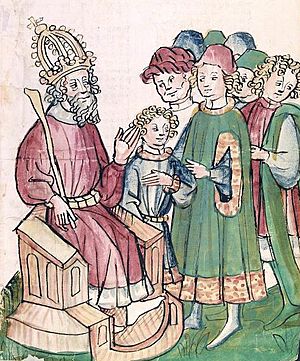Seven Wise Masters facts for kids
The Seven Wise Masters is a collection of old stories. They are also known as the Seven Sages or Seven Wise Men. These tales come from ancient India, Persia, or Hebrew cultures.
These stories have been told for hundreds of years. They often share lessons about wisdom and cleverness.
Contents
The Main Story: A Prince, an Empress, and Wise Men
The collection of stories has a main plot that holds them together. This is called a frame narrative. Here is how it usually goes:
A Sultan sends his son, a young Prince, away from the palace. The Prince goes to learn from Seven Wise Masters. They teach him many important subjects.
When the Prince returns, his stepmother, the empress, tries to trick him. To keep him safe, Sindibad, the leader of the wise masters, tells the Prince to stay silent for a week.
During this time, the empress tells the Sultan lies about the Prince. She tells seven stories to try and get the Prince killed. But each time, the Seven Wise Masters, led by Sindibad, tell a story that proves her wrong.
Finally, the Prince is allowed to speak. He tells the truth, and the wicked empress is punished. This main story was a clever way to share many smaller tales.
Where Did These Stories Come From?
These stories are very old and come from the East. They have appeared in many languages across Europe.
One idea is that they started in Sanskrit in India. Some people think an Indian thinker named Syntipas wrote them long ago. However, the original Indian version is not known today.
Other ideas suggest they came from Persia. This is because the oldest copies we have are in Persian. Some also think they might be from Hebrew culture. This culture has similar tales, like the story of Joseph from the Bible.
The Eastern Versions of the Tales
The Eastern version of these stories is called The Book of Sindibâd. It is also known as The Book of Seven Viziers. People believe it came from an Arabic book written around the 700s.
You can find these stories in many languages. These include Syriac, Arabic, Persian, Greek, and Old Spanish.
Oldest Syriac Stories
The Syriac Sindban is one of the oldest copies of these tales that still exists.
Persian: Sindibad-nameh
There are three versions of the story in Persian. One is a poem, and two are prose (like a normal book). They were written between the late 1100s and late 1300s. One of these prose versions is part of another story collection called Tutinama.
Arabic: The Book of the Seven Vizirs
The Arabic versions we have now are from later times. But experts believe older Arabic versions existed before them.
Greek: Syntipas
This is the version of the story that comes from the Byzantine Empire (ancient Greece).
Old Spanish: Sendebar or Libro de los Engaños
Some Old Spanish versions follow the European style. But Libro de Los Engaños (The Book of Tricks) is part of the Eastern tradition.
The Western Tradition: Stories in Europe
Hundreds of European versions of these stories still exist. They usually have fifteen tales. One tale is from each of the seven wise men. Seven tales are from the stepmother. And one tale is from the prince.
Even though the main story is the same, only a few of the smaller tales are found in both Eastern and Western versions.
Dolopathos: Latin and French Versions
The stories traveled from the East to Europe. They went through Arabic, Persian, Syriac, and Greek languages. In the 1100s, a monk named Jean de Hauteseille translated the Greek version into Latin. He called it Dolopathos.
Around 1210, a French poet named Herbers translated Dolopathos into French. He called it Li romans de Dolopathos.
The Seven Sages of Rome
Another French version, Roman des sept sages, came from a different Latin original.
Many German, English, and Spanish storybooks are based on a Latin version different from these. In England, three rhyming stories from the 1300s are based on the French version. One important one is The Sevyn Sages by John Rolland.
German: Sieben weise Meister
German versions of the Seven Sages include both poems and prose stories. Most of them follow the Latin Historia. But sometimes they change the order or choice of the tales.
The oldest known German version is Dyopcletianus Leben from 1412. Most of the copies we have are from the 1500s to 1700s. They were often included in German versions of the Gesta Romanorum (another collection of stories). These stories were very popular in the Middle Ages.
How These Stories Influenced Other Works
This collection of tales later provided stories for many other works. These stories were told both orally (by speaking) and in written books. Giovanni Boccaccio used many of them for his famous book, the Decameron.
The Latin version of the story was printed many times in the 1400s. An English version was printed around 1515.
The Seven Sages Society was started in 1975. It keeps track of all the scholarly writings about these stories.
Example Story: The Three Languages
One story often found in this collection is called "The Three Languages". This tale is about a common boy who can understand animal talk. The animals talk among themselves about how the boy will one day rule over his parents.
His parents get angry and send him away. After many adventures, the boy becomes a king or a pope. He then returns to his family's house. His parents serve him, and he finally tells them who he is.
See also
- The Book of the Wiles of Women, 13th-century Spanish version of the tales
- Tutinama, another collection of Indian stories about women
 | Roy Wilkins |
 | John Lewis |
 | Linda Carol Brown |


